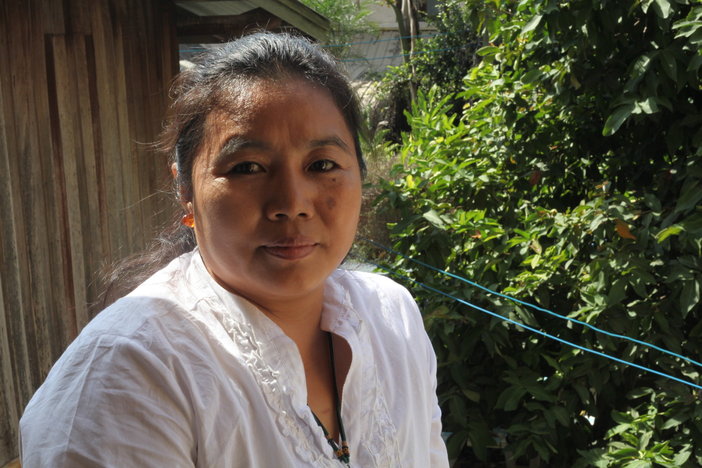Activist Bauk Ja, after standing trial in northern Burma’s Kachin State for allegedly causing the death of her neighbour by providing him medical treatment without a license, has been released from jail.
Bauk Ja, who is also the Kachin State chairperson of the National Democratic Force party, is well known for her activism; she has assisted farmers fighting against corporate and military land grabs, and provided education courses for Kachin State’s marginalised youth. She also operated a family-owned clinic in Hpakant’s Aungywa village, which provided treatment for those without access to hospitals.
Last July, Bauk Ja was apprehended for administering treatments that allegedly led to the death of her neighbour, Zaw Ja, when he fell ill in 2009. She has since been standing trial on charges of negligent homicide, administering medical treatment without a doctor’s license, and unauthorised use of a syringe.
On Saturday, Hpakant Court acquitted her of the two former charges, and passed six months’ prison term on the latter charge which was commuted for time spent in detention since her arrest.
Bauk Ja spoke with DVB’s Nang Mya Nadi about her prison term, the Burmese justice system, and her future outside of detention.
DVB: First of all, how are you doing?
BJ: I am in good health but have not been sleeping well, because I miss my prison mates.
DVB: How was your time in prison?
BJ: I was kept in a separate cell where I was allowed to move about freely.
DVB: So you have been acquitted?
BJ: I was acquitted from two of the three charges, and sentenced to six months term on the remaining charge. But the term was commuted by time spent in detention while awaiting trial.
DVB: Do you think the verdict was fair?
BJ: No. I had nothing to do with what happened; rather, I was arrested on political motives, with elaborately framed charges which I fought. Still, I was found guilty on one charge.
DVB: What are you planning next?
BJ: I’m planning to appeal the verdict which I see as unfair, for the sake of justice in the legal system.
DVB: How many court hearings were there?
BJ: There were almost 40 court hearings. I spent 212 days in detention – the trial was prolonged due to officials deflecting responsibility back and forth, and also they had to wait for orders from superiors before making any decisions.
DVB: If you can suggest one thing to improve the legal system, what would it be?
BJ: There is a need for free and fair trials – it was clear during my case that officials from various government departments would wrap things up in red tape and await orders from superiors, which was one of the reasons why my verdict took so long.
DVB: What are the pros and cons of having your trial delayed?
BJ: It was very damaging to me to have spent such a long time in detention because it wasted a lot of time I could have spent working for the people.
DVB: Is there anything you’d like to say to your colleagues and supporters who have been calling for your release?
BJ: I am delighted to see their support expressed through prayers, statements and pressure on the government – I would also like to thank the media and the public for promoting awareness of my case, which helped lead to my release.
DVB: Is there anything you would like to say to the judges who passed your verdict?
BJ: I would like to tell them that they shouldn’t be afraid of senior government authorities, and that I hope they will one day become judges who have the courage to do what is right, and really serve the interests of the people.
DVB: Would you like to make any additional comments for our readers?
BJ: I would like to thank everyone who works for our country, regardless of where they are in the world, and I would like to extend a hand to them to work together with us towards bringing development and human rights to the country.
[related]



